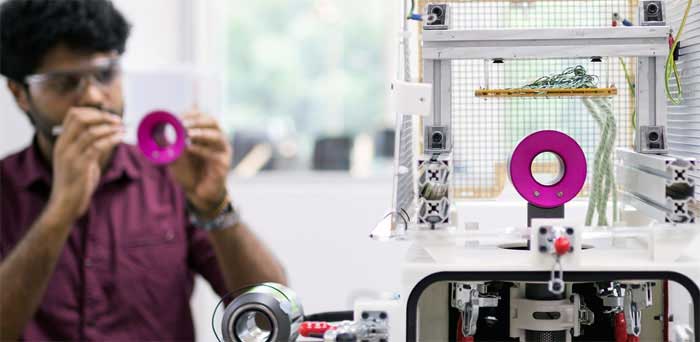The government's focus on developing Singapore into a Smart Tech nation has not escaped the attention of many multinational technology brands. One of the latest announcements from a global company with its eye on the fertile ecosystem of the city is UK appliances innovator Dyson, who are considering founding their first university outside of the UK in Singapore.
This comes after significant interest from the company, who announced in 2018 that they are going to open a manufacturing plant in Jurong, and in early 2019 decided to move their head office to the high tech island too. Founder James Dyson made international headlines this year after purchasing an extravagant penthouse in trendy Tanjong Pagar, in order to be closer to his award-winning companies headquarters. The city-state caught Dyson's eye as the ideal location for testing out and developing their first electric car, which is set to be released in 2021.
The company is now considering making use of the potential technical talent in Singapore - the many budding engineers, innovators and creatives - by founding a private university in the city-state. They hope to seek degree-giving status from the UK government, which would see it join the ranks of six private universities in the United Kingdom - many of which have sprung up in recent years.
Previously, the company funded an institute in collaboration with Warwick University in Wiltshire, where students could train towards a degree in engineering, while being paid a salary and gaining practical skills at the same time, under the mentorship of Dyson's engineers. The global brand provided more than £15 million in funding for this flagship Institute of Engineering and Technology, and the four-year program launched in 2017, providing training to 33 students, out of 850 eager applicants.
Sir James Dyson described his motivation for funding this institute as stemming from a need for highly skilled engineers in the UK, and that he wanted to help people to gain new skills and graduate debt-free, whether they wanted to work for Dyson or were motivated to start their own businesses - something that would make the engineering research and development scene even more fertile for new innovations and ideas. Dyson's plan for a new university is part of a plan to grow the engineering industry in the Asia-Pacific region too.
If Dyson is awarded degree-giving powers for its new Singaporean institute, locals may be able to expect a similar scheme. Already, Singapore is due to be home to the Dyson-NTU Studio, the British company's first campus engineering studio in Asia. This is run with Nanyang Technological University, and is focused on new research and development (R&D), with students of all levels able to access unique prototyping equipment and technology used by the company, and ample support from industry experts to bring their ideas to life. It will simulate working at Dyson, so that the company can recruit high-quality graduates.
Dyson already has over 1,000 employees in Singapore, who work from their offices at the Singapore Technology Centre at the Singapore Science Park. They are aiming to create a new engineering centre at their offices here, and to increase their engineering team by 50% over the next few years. In order to do this, they have their eye on some of the high-quality engineering graduates who call the city home, aiming to hire 190 new engineers over the next five years.
The decision for Dyson to move to Asia may be a result of the company's high growth levels in the Asia-Pacific region. More than half of Dyson's £1.1 billion annual profit is generated from Asia, and this has increased by 30% in 2018 compared to the year before. They may also be spurred on by Singapore's unique focus on smart tech, with the government eagerly fostering new research and development, industry growth and collaborating with the private sector, as well as the large pool of talented young graduates, which could ensure Dyson's success for years to come.

